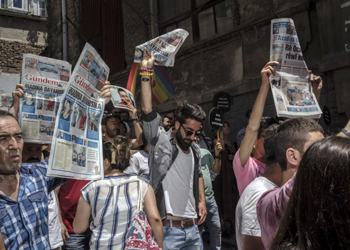2018 Gulbenkian Prizes winners

The Calouste Gulbenkian 2018 Prize, worth 100,000 euros, is awarded to Article 19, a non-governmental organisation which, ever since 1987, has fought in defence of freedom of expression. Its name stems from Article 19 of the Universal Declaration of Human Rights, which established that right seven decades ago. The Calouste Gulbenkian Prize distinguishes individuals or non-profit private legal entities who stand out in the defence of Human Rights.
The national winners of the Gulbenkian Prizes 2018 in the defence and promotion of knowledge, cohesion and sustainability are awarded respectively to the Cultural Association “O Espaço do Tempo”, founded by the dancer and choreographer Rui Horta in Montemor-o-Novo; to the project that promotes housing for the homeless “É uma Casa, Lisboa Housing First”, run by the Association “Crescer na Maior”; and Coopérnico, the only renewable energy cooperative existing in Portugal. Worth 50,000 each Prize, these awards distinguish leading projects in the three strategic fields for the Gulbenkian Foundation: Knowledge, Cohesion and Sustainability.
About the International Prize:
CALOUSTE GULBENKIAN PRIZE / Human Rights
Winner: Article 19
This year with a particular focus on freedom of expression, information and the press, the Calouste Gulbenkian Prize distinguishes a non-governmental organisation that has undertaken over three decades of strident struggle against censorship and providing support for dissident voices to a greater or lesser extent all over the world. With offices in countries such as Mexico, Brazil, Tunisia, Senegal, Kenya, Bangladesh, the United Kingdom and the United States, Article 19 provides support and protection to individual activists and journalists in the field and collaborates with organisations such as the United Nations, the African Union, the European Union, the Council of Europe and the Organisation of American States, among others.
Its members defend the total freedom of expression, understanding its strategic areas as the civic space, media and digital channels, protection and transparency. The jury of the Calouste Gulbenkian Prize highlighted the importance of this “holistic approach” which had turned the organisation into a “leader of Human Rights and a global specialist in freedom of expression”. The jury took into account the “unique work” and always “on the front line” over the last three decades, applauding its firm response to the “challenges and threats to freedom of expression and information that undermine Human Rights, democracy and the rule of law”.
Chaired by Jorge Sampaio, the Calouste Gulbenkian Prize jury is composed of Demetrios G. Papademetriou, Jody Williams, Leymah Gbowee, José Ramos Horta and Emílio Rui Vilar.
The Calouste Gulbenkian Prize was awarded for the first time in 2012 to the West-Eastern Divan Orchestra, the group led by Daniel Barenboim, before in the following years going to the Library of Alexandria (2013), the Sant’Egidio Community (2014), the Congolese doctor Denis Mukwege (2015), to the Sustainable Amazonas Foundation (2016) and, ex-aequo, to the Hungarian Helsinki Committee and Jane McAdam (2017).
About the National Prizes:
GULBENKIAN COHESION PRIZE
Winner: É uma Casa, Lisboa Housing First
The jury recognises the excellent results obtained by the winning project, which provides responses to the problems of homelessness in the city of Lisbon. Developed by the Association “Crescer na Maior”, the É uma Casa, Lisboa Housing First project provides housing to persons facing situations of social exclusion and vulnerability, implementing a methodology that the jury described as “effective and with the greatest potential for structural changes in the target population” in keeping with statistics showing that 90% of the homeless who receive such housing do not return to the street. The jury also highlighted the capacity of this project to inspire public policies in Portugal where there are an estimated 3,500 homeless persons.
GULBENKIAN KNOWLEDGE PRIZE
Winner: O Espaço do Tempo
Established in a former convent in Montemor-o-Novo in 2000, O Espaço do Tempo is a reference in the field of the performing arts. The jury distinguishes “the unquestionable impact” of the work carried out over the years by this association, highlighting the “strong connection to the local community, especially the schools”, furthermore emphasising “the serious structural weighting of the work undertaken and the solidity of the accumulated experience”. Run by the dancer and choreographer Rui Horta, O Espaço do Tempo stages artistic residencies in the fields of theatre, dance, performance, music and the visual arts, with a particular focus on emerging, contemporary creativity.
GULBENKIAN SUSTAINABILITY PRIZE
Winner: Coopérnico Cooperative
Underlying the jury’s decision to award the Gulbenkian Sustainability Prize to the Coopérnico Cooperative is the “clearly innovative character” of this association and the “great relevance” of the field of renewable energies. The jury highlights the fact that the prize winner, set up five years ago and currently with over a thousand members, remains the only renewable energy cooperative in Portugal. Its democratic management and non-profit approach to the areas of production, retail and energy efficiency received the applause of the jury, which also highlighted how this is a model susceptible to replication in Portugal.
Chaired by António Feijó, the Gulbenkian Prize jury includes the following members: Henrique Leitão, Miguel Tamen, João Ferrão, Paula Guimarães, Teresa Mendes and Sofia Guedes Vaz.
Go to Gulbenkian Prizes
